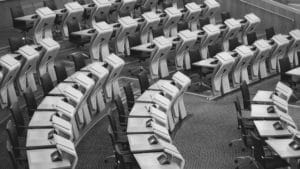The Prime Minister has been all over the country this week. Henry Anderson and Lawrie Scott-McFarlane pick up the story…
It’s the final countdown
Like a slow-motion charge of the light brigade, Theresa May has continued on her futile push to sell her Brexit deal. Despite widespread acceptance that the Prime Minister will lose the vote on the Withdrawal Agreement, she has pressed ahead with visits to Northern Ireland, Wales and Scotland this week. She has also agreed to a debate on the BBC with Jeremy Corbyn, who has agreed to one on ITV. Regardless of these efforts, defeat for the PM looks certain, with all opposition parties and 100 of her own MPs publicly opposed. Labour and a cross-party group headed by committee chairs and Brexit Committee Chair Hilary Benn have put down amendments rejecting both the PM’s deal and no deal, while Benn’s seeks to give Parliament the ability to direct negotiations. There are also reports of other cross-party efforts and the potential for a SNP amendment, while today the Prime Minister suggested she might have a second try if the first vote fails. Up to six amendments will be selected by John Bercow ahead of the vote on Tuesday 11 December. It’s less than clear what happens next.
Brexit brings people closer
In at least one sense, Theresa May has achieved the impossible. Her deal is regarded so poorly in Scotland that it has brought together old enemies: SNP, Labour, the Greens and the Liberals. Only the Conservatives have been left standing alone, as the other parties’ spokespeople issued a joint statement announcing they would table a single motion opposing the Prime Minister’s deal when the Scottish Parliament votes on the deal on Wednesday 5 December. The text of the motion should be revealed this weekend – we know it will oppose no deal, reject the PM’s option and point to “possible alternatives”. The motion might sacrifice setting out a specific route forward in order to secure agreement, given Labour’s support for a second referendum only after a general election and the Liberals inability to talk about anything but an immediate ‘People’s Vote’. Though the vote will not be legally binding, it will underscore the strength of opposition in Holyrood to what many perceive to be the Prime Minister’s high-handed approach to the Scottish Parliament.
David Lidington under interrogation
There was a joint meeting of Holyrood’s Constitution and Europe committees this week, where MSPs questioned Minister for the Cabinet Office, David Lidington, on the Withdrawal Agreement. The Minister got off to a rocky start after apologising to “Jo McNaughton” (Joan McAlpine, one of the conveners) for overdue correspondence. The atmosphere was frosty throughout, as is typical of Holyrood committee meetings involving the UK Government. The committee members, which include former Scottish Government ministers, probed the potential effects of the deal on Scotland’s trade, population growth and economy. In contrast, Conservative members opened with softer questions which gave the Minister a chance to highlight the advantages of the deal. Throughout, members were grimly informed that there were no alternatives on the table. The Committee was told that the European heads of government were sick of negotiations, that businesses wanted politicians to “get it done”, and that no other parties had proposed a viable way forward.



